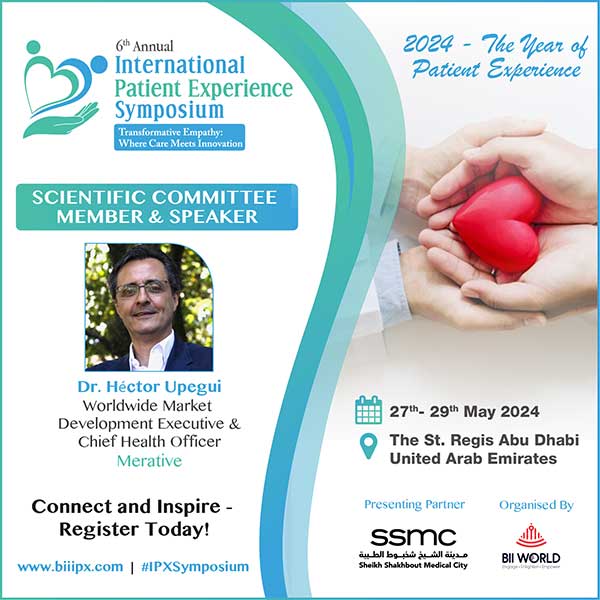1. How do you perceive the significance of 2024 as “The Year of Patient Experience,” and what key developments do you foresee in the realm of patient-centered care?
The patient experience approach is a collective journey for all participants within the system. Designating 2024 as the Year of Patient Experience aids in maintaining a trajectory towards success. The construction and recognition of milestones within this journey are crucial. They provide a clear direction and foster moments of reflection on both achievements and shortcomings. Moreover, it’s important to acknowledge that the realm of medicine and social services is a shared space, not exclusive to a single institution or practitioner. Thus, it’s also evident that collective gatherings facilitate the exchange of experiences and knowledge, thereby shortening learning curves and fortifying the journey.
2. As we delve into the theme “Transformative Empathy: Where Care Meets Innovation,” how do you envision empathy driving innovation in healthcare practices to enhance the patient experience?
The patient-first approach has always been a core element in medicine. However, enhancing the patient experience in an increasingly fragmented system requires an empathetic approach that extends beyond healthcare provision and outcomes. It should consider the individual’s service expectations, including family members’ expectations and expected outcomes. For example, a patient with complex comorbidities living alone may have different expectations compared to a similar patient with family support.
3. Could you share insights into how bridging health and social aspects contributes to achieving better patient outcomes, aligning with the symposium’s theme?
Living longer often comes with a higher incidence and prevalence of chronic diseases, leading to increased complexity in treatment. As healthcare facilities become more crowded, it’s crucial to develop additional initiatives supported by technology for remote treatment and surveillance. These advancements can help manage patients more effectively and alleviate the burden on healthcare facilities.
An eagle-eye perspective of the healthcare system reveals that beyond the borderlines of healthcare, social assets need to be better activated to achieve better patient outcomes. Healthcare cannot do it alone; improving the coordination of social services and resources is essential. By bridging health and social aspects, we can create a more holistic approach to patient care, addressing both medical and social outcomes.
4. What specific challenges do healthcare providers face in integrating transformative empathy into their practices, and what strategies do you recommend to overcome these obstacles?
Healthcare providers face significant challenges in integrating transformative empathy into their practices, primarily due to the complexity of healthcare and the limited time available during medical appointments. This often results in insufficient time to deeply understand and address patients’ emotional and social needs. Additionally, a lack of support from the healthcare ecosystem in breaking silos further complicates efforts to provide empathetic care. Poor referral systems and a lack of visibility on what to do when additional help outside the healthcare system is needed exacerbate these challenges.
To overcome these obstacles, healthcare providers can adopt strategies such as enhancing interdisciplinary communication and collaboration. Establishing robust support systems within the healthcare ecosystem, while accelerating interactions with societal assets, can help break down silos and improve referral processes. Additionally, leveraging technology to streamline patient information and care coordination can free up time for providers to engage more empathetically with patients. Providing training and resources to healthcare professionals on integrating empathy into their practice can also help foster activities for achieving a more patient-centered approach.
5. In your opinion, how can interdisciplinary collaboration among healthcare professionals, technologists, and patient advocates foster a culture of empathy-driven innovation, ultimately shaping the future of patient care?
Interdisciplinary collaboration among healthcare professionals, technologists, and patient advocates is crucial for fostering a culture of empathy-driven innovation. By working together, these diverse groups can share unique perspectives and expertise, leading to the development of more holistic and patient-centred solutions. For example, technologists can create tools that enable better communication and coordination among care teams, while patient advocates can provide insights into patients’ needs and experiences, ensuring that innovations truly address their concerns.
This collaborative approach can also drive continuous improvement in patient care. By integrating empathy into every aspect of healthcare, from technology development to clinical practice, we can create a system that prioritizes the well-being of patients. This not only enhances the patient experience but also leads to better health outcomes. Ultimately, fostering a culture of empathy-driven innovation requires a commitment to ongoing collaboration and a willingness to challenge traditional practices in favour of more compassionate and effective care.
6. How do you think participants will benefit by attending 6th Annual International Patient Experience Symposium?
Participants attending the 6th Annual International Patient Experience Symposium will benefit from a wealth of knowledge and networking opportunities. They will gain insights into the latest trends and best practices in patient-centred care, learning from experts and peers who are at the forefront of the field. The symposium will provide a platform for exchanging ideas, experiences, and strategies, helping attendees to enhance their own practices and improve patient outcomes.
Additionally, the symposium will offer participants the chance to engage in meaningful discussions about the future of healthcare. By exploring innovative approaches and solutions, attendees can stay ahead of emerging challenges and opportunities. This event will not only inspire and educate but also empower healthcare professionals to implement transformative changes in their organizations, ultimately leading to a more empathetic and effective healthcare system.


